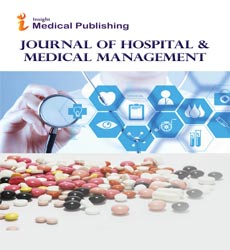Competency and Curriculum Development for Preventive Medicine
Tulae Kavlak
DOI10.36648/2471-9781.21.7.292
Tulae Kavlak*
Department of Medicine, University of Istinye, Turkey
- *Corresponding Author:
- Tulae Kavlak
Department of Medicine, University of Istinye, Turkey
Tel: 8234701108
E-mail: tulae.kavlak@gmail.com
Received Date: September 04, 2021; Accepted Date: September 09, 2021; Published Date:September 14, 2021
Citation: Kavlak T (2021) Competency and Curriculum Development for Preventive Medicine. J Hosp Med Manage Vol.7 No.9:292.
Editorial
During 2012, the USDHHS's Health Resources and Services Administration supported 12 accredited preventive medication residencies to fuse a proof based integrative medication curriculum into their preparation programs. It additionally supported a public planning community at the American College of Preventive Medicine, known as the Integrative Medicine in Preventive Medicine Education (IMPriME) Centre, to give specialized help to the 12 grantees. To assist with this undertaking, the IMPriME Centre set up a multidisciplinary controlling board of trustees, knowledgeable in integrative medicine, whose essential point was to foster integrative medication centre capabilities for consolidation into preventive medication graduate clinical schooling preparing. The capability advancement process was educated by focal integrative medication definitions and standards, preventive medication's dual role in clinical and populace based anticipation, and the thriving proof base of integrative medicine. The controlling panel considered an interdisciplinary integrative medication contextual framework directed by a few topics identified with labour force improvement and populace wellbeing. A list of nine capabilities, planned to the six general areas of ability endorsed by the Accreditation Council of Graduate Medical Education, was operationalized through an iterative exercise with the 12 grantees in a cycle that included planning each site's skill and curriculum items to the centre skills. The skills, alongside focal curricular components educated by grantees ‘work introduced somewhere else in this enhancement, are laid out as a roadmap for residency programs intending to join integrative medication content into their curricula. This arrangement of skills adds to the bigger endeavours of the IMPriME drive to facilitate and improve further educational program advancement and execution by not just the current grantees but different partners in graduate clinical schooling around integrative medication preparing.
During 2012, the American College of Preventive Medicine set up a public coordinating centre in integrative medication, supported by the USDHHS's Health Resources and Services Administration, which gave specialized help regarding competency and educational program improvement to 12 Health Resources and Services Administration–financed accredited preventive medication residencies as they incorporated evidence-based integrative medication content into their programs. Supporting this work, the planning centre, known as the Integrative Medicine in Preventive Medicine Education (IMPriME) Centre, met multiple stakeholder gatherings, including an IMPriME steering committee, accomplice associations, and an IMPriME Community of Learning made out of individuals from different scholastic and medical care callings. The IMPriME inter professional directing panel consisted of nine substance specialists in integrative medication; complementary and integrative wellbeing (as characterized by NIH); and general wellbeing or general preventive medicine. This board of trustees teamed up with grantees to develop core instruction capabilities that would be pertinent to curricular plan and execution of integrative medicine with regards to preventive medication residency programs. The accomplice associations and local area of learning drew in their bodies electorate and gave abroad base of topic skill depending on the situation all through the undertaking length. The course of coordinating IMPriME endeavours was steady with the American College of Preventive Medicine's main goal to improve the wellbeing of people and populaces through proof based wellbeing advancement, infection avoidance, and systems-based ways to deal with further developing wellbeing and health care. This paper expresses the ability development measure and related results and presents mutt regular direction as controlled by project partners as a procedure for residency programs expecting to incorporate integrative medication content into their educational plans.
As a first step in ability improvement, the IMPriME steering panel framed a subcommittee of three members, experienced in capability advancement and integrative medication, to work with improvement of integrative medicine skills fitting to preventive medicine residency preparing. The subcommittee fostered a broad contextual system inside which key capabilities of integrative medication educational plan may be viewed as for inclusion into residency educational plans. The proposed framework was aware of the accompanying four significant topics currently emphasized in wellbeing and medical care.
Open Access Journals
- Aquaculture & Veterinary Science
- Chemistry & Chemical Sciences
- Clinical Sciences
- Engineering
- General Science
- Genetics & Molecular Biology
- Health Care & Nursing
- Immunology & Microbiology
- Materials Science
- Mathematics & Physics
- Medical Sciences
- Neurology & Psychiatry
- Oncology & Cancer Science
- Pharmaceutical Sciences
